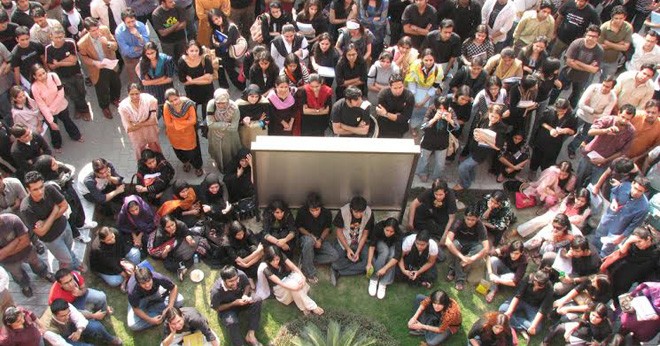
Ask the 20-somethings what Zia was all about and they remember his ‘Islamisation’ drive

"Every time an Ahmadi dies, a Christian home is destroyed or a Hindu temple is vandalised, I recite a silent prayer cursing Zia," says Amin Shah Gilani, a 22-year old recent graduate from Lahore School of Economics. Like myself, Gilani belongs to a generation born after Ziaul Haq, one that has reaped the results of his policies.
This is a generation that has grown up with stories that seem as if they belong to a different country -- grandmothers who dressed up and walked to college, ballrooms where people went to dance, and also maybe where religion was less complicated.
It’s a pretty picture and so, like our parents, we also devote our political debates trying to establish where they went wrong. And Ziaul Haq is the name that is mentioned over and over again. There is very little dissent.
But some like Muntaha Khan, a 20-year old studying Law at University College Lahore, defends his policies arguing, "He might have been a maulvi but whatever he did, he did in order to resist the Godless communists, who would have been ruling over us now if it weren’t for him doing everything to quell the Afghan Communist regime."
For him, the blame lays elsewhere, "Zia might have screwed up a few things, like the Hudood Ordinance, but mostly he doesn’t seem that bad. The three most important changes to make us sound as a Muslim nation --Qadiani’s being declared non-Muslims, alcohol banned, and taking Friday as a day-off was all done in Zulfikar Ali Bhutto’s era. This makes him more of an Islamist then Zia," says Khan.
These are common allegations that the Bhutto government has faced time and again, and there is a general agreement that his government, too, made concessions. Yet, everything that Bhutto did was nothing compared to the ‘reforms’ brought about by Zia.
The Hudood Ordinance, a regressive document, devising punishments beyond the boundaries of basic human rights is and will always be Zia’s legacy. It was Zia’s referendum that made people chose between democracy and Islam. "The Objectives Resolution had existed before him but it was Zia who made it operative," says Saad Saud, 25, a graduate in International Relations.
Zia’s legacy is also not complete without mentioning Ordinance XX, and the blasphemy laws. "Zia focused these more towards Islam and the Muslims," adds Saud, referring to the additions made to these laws in 1982 and 1986 where 295 (b) and 295 (c) were added.
"The dictator who ruled with an iron fist, legitimising every move through religion now also faces allegations for changing the culture of our country. He not only made sure we went back to age-old customary practices but made sure we became, Arabised Muslims," says Rehma Rabab Hyder, 23, a graduate from Kinnaird College, Lahore.
"What he did was morph Islam with Arabic culture, thus completely eroding the cultural identity of Pakistan, one big reason for the sectarian and ethnic violence today," she adds.
For others, mentioning Zia brings back memories of cramming for Pakistan Studies and Islamiat. "I hate that I have to study these subjects in Bachelors as well," says Salman Asif, a 20-year old medical student. At lower levels, such as Matriculation or O-levels, this has been done at the expense of world history.
"World history and geography are subjects which I know very little about and that is a setback for me," says Aman Bashir, 24, a graduate from Pennsylvania State University, who completed his Matriculation from Gujrat.
What remains clear though is that any discussion on Zia or his regime focuses on his policies of ‘Islamisation’. When studying Pakistan Studies, it forms the main crux of Zia’s tenure. We have memorised his ‘Islamic polices’ and referendum question to reproduce in exams. "He has ruined the country’s vision, its progressive potential and its capacity to be at par with our neighbouring countries," says Elaine Alam, 25, General Manager at an NGO.
And that to us is what Zia was all about -- a regressive leader, whose policies we are still suffering from.